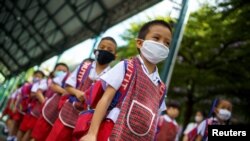The coronavirus is threatening the livelihoods of 600 million children in South Asia, UNICEF said in a report released Tuesday.
The report, “Lives Upended,” describes how the pandemic is unraveling decades of progress on the health, education and other advances for children in South Asia, and calls on governments to take immediate action.
“The side effects of the pandemic across South Asia, including the lockdown and other measures, have been damaging for children in numerous ways,” said Jean Gough, UNICEF regional director for South Asia. “But the longer-term impact of the economic crisis on children will be on a different scale entirely. Without urgent action now, COVID-19 could destroy the hopes and futures of an entire generation.”
As the economic impact set off by COVID-19 takes effect, up to 120 million more children in South Asia could be pushed into poverty, the report said.
Crucial health services such as immunization and nutrition have also been disrupted.
About 7.7 million children in South Asia already suffer from severe wasting — dangerous thinness caused by inadequate dietary intake or diseases. In order to help children affected by severe wasting, UNICEF is calling on governments to resume vaccination campaigns against polio, measles and other diseases.
The report also says a decrease in out-of-school children and child marriages has been matched by improvements in infant and maternal mortality in the region over the years.
However, the coronavirus pandemic has caused more than 430 million children in South Asia to rely on remote learning, who could now join the 32 million children who were already out of school.
According to the report, there has been an increase in telephone calls to helplines from children suffering from violence and abuse while confined at home due to the pandemic. In 2016, South Asia was home to 64% of the world’s children experiencing severe violence.
To tackle the threatening effects the pandemic has had and will have on the livelihoods of the 600 million children in South Asia, UNICEF is urging governments to immediately direct more resources toward social protection plans, including emergency universal child benefits and school feeding programs.
“Putting such measures in place now will help the countries of South Asia transition faster from the humanitarian crisis caused by COVID-19 to a resilient and sustainable development model, with long-term benefits for child well-being, the economy and social cohesion,” Gough said.





